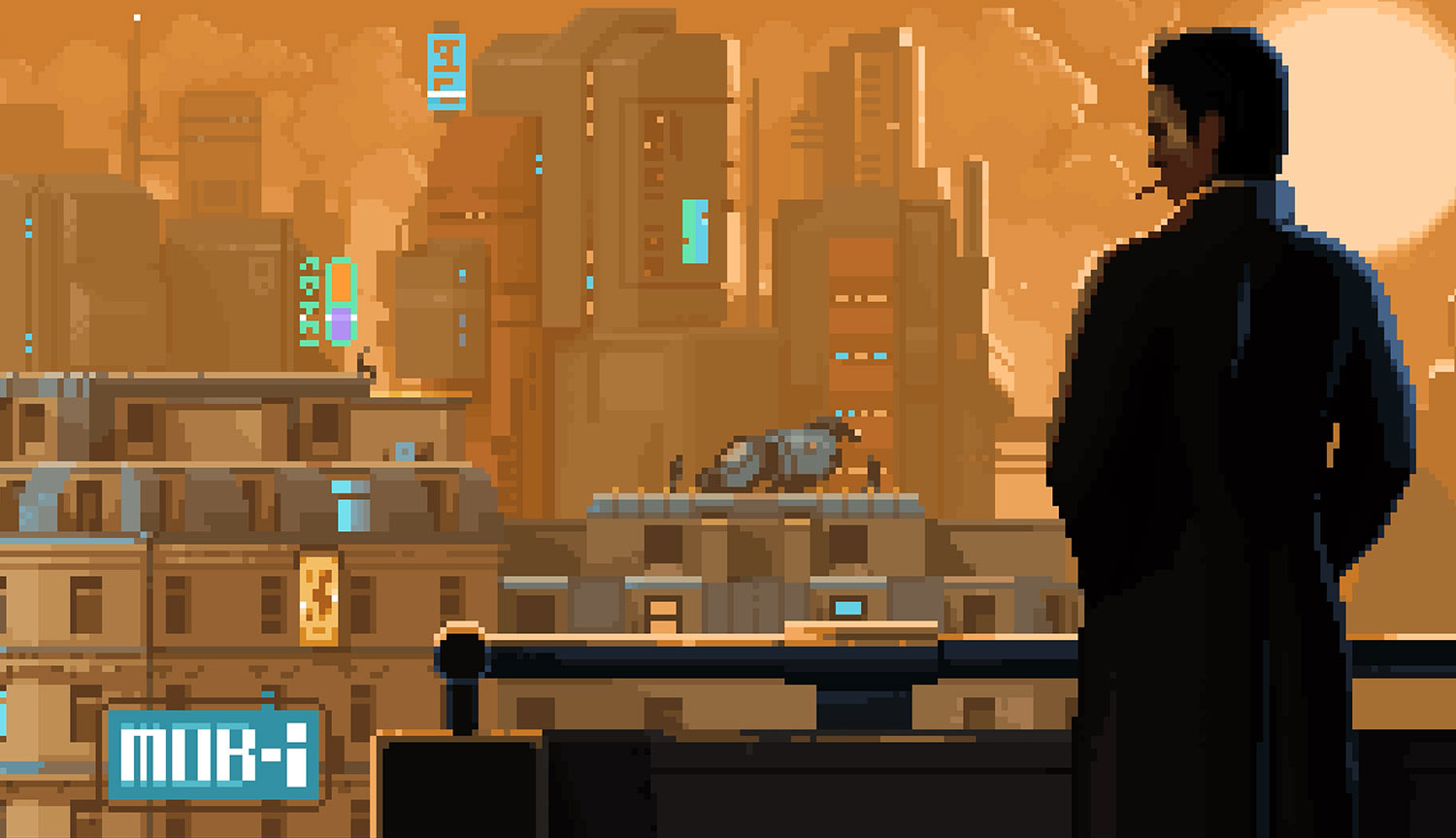Blade Runner introduced us to Rick Deckard, the futuristic twin of film noir’s jaded detective. Two years later, the cyberpunk movement took flight with William Gibson’s seminal book, Neuromancer, which featured a heist gone wrong. Ever since, riffs on film noir and crime seem to go hand in hand with the cyberpunk genre.
Lacuna is one of the many games which uses the archetype of the cyberpunk detective – a genre which includes the ill-fated Cyberpunk 2077, and of course, the notable 1997 Blade Runner game. Where many games fall over is in the crime aspects of the investigation: too often there’s a magical detection device which scans the room for you. These spidey senses are an overused feature of modern gaming, and takes away some of the experience of actually being a detective, when the clues are essentially handed to you through x-ray vision.
Thankfully, Lacuna is not that game. I haven’t felt more like a detective than when playing the 2021 indie game Lacuna from DigiTales Interactive, because the puzzles force you to come to challenging but logical conclusions. The game is not a long game, but not taking your time in investigations early on can have a domino effect on gameplay. I spent a lot of Lacuna puzzling out the problems in my notebook, before I even dared to lock in my conclusions. But boy was it satisfying when I got them right.
While Lacuna promises a sci-fi noir game, it opens on Drovia while playing a young girl named Mira. For me, the opening was the weakest part of the game. I’d been sold a detective game, and here I was playing a little kid doing what was essentially a tutorial level. While you get through it fairly quickly, it took me aback given my expectations. I wondered if this would have been better off as a media item or news broadcast early in the game.

However, it’s worth paying attention to the information given here about the planets and the local Saviant religion. I found myself late in game trying to remember which planet was which, and this is important to your investigations later. Given the complexities of the story, I found it helpful to take notes as I played.
After the brief prologue on Drovia, you soon find yourself playing Neil Conrad, a classic hardboiled agent for the CDI, divorced, jaded with life, and putting his job before his relationship with his daughter. While it’s a bit of a cliché, I didn’t mind his character or his good relationship with his ex-wife Catherine, which you can choose to pursue or not through the story.
With the assassination of Drovia’s foreign minister, Conrad must track down the killer, which leads him to uncover a planet-spanning conspiracy full of twists and turns. Many of the perpetrators of the crimes are forced into it through poverty, and there’s a clear moral commentary on extreme capitalism here. The rich live in luxury, the poor below, in a den of drugs, vice, and crime. Harking back to cyberpunk’s roots in the 80s, there is of course, an evil corporation. While I suspect we’ve moved beyond these archetypes in crime storytelling, it goes with the territory of Omni Consumer Products and Weyland-Yutani.

One of the most exciting and interesting puzzles in Lacuna is deducing the appearance of the assassin. Delving further into the clues reveals more and more, and you’ll need to use your powers of deduction to figure out what the assassin looks like at any one point in time. You’ll need all the clues and research at your disposal, and you’ll find yourself looking at every news item and clue you’ve collected to make sure you haven’t missed anything.
Notably, there’s no save files for you to go back and change your decision, heightening the seriousness of your choices. You’ll think long and hard before you confirm your conclusions.

As a crime fiction lover, I really appreciated the depth of this game as a crime story. My brain got caught up in the convoluted complexities of the mastermind behind Lacuna’s crime, and I got every puzzle right except for the last one – mostly due to me thinking the obvious couldn’t possibly be true! But I really enjoyed this aspect of the game. Too often, crime games don’t think hard enough about what it’s like for detectives to bring together disparate sources of information to come to a conclusion.
As someone who enjoys looking at narrative design, I did appreciate how difficult some of these choices could be. Would you lose your job if you chose a certain path? Would someone die? Should you withhold information in order to prevent more deaths? This certainly reflected the more noirish influences on the game. But as with the best crime stories, there are no happy endings, just morally grey ones.
The pixel-art graphics hark back to classic point and click adventures, and I particularly liked the way the city grew upwards from the train stations which Conrad uses to navigate the city. Excellent lighting effects and environmental depth add significantly to the noir atmosphere.

The music by Julian Colbus is notable as a game soundtrack, as the plaintive piano and jazz tracks really set the tone for the game. There is little voice acting save that of the occasional voiceover by Conrad in interstitial moments, but the text dialogue is tight. You won’t get bored scrolling through dialogue options, because the game forces you to make choices quickly.
If you enjoy choice based detective games, then Lacuna is worth checking out. The quality puzzles provide even the most experienced gamers with a challenge, and while it labours under the shadow of the genre’s archetypes, the complex plot makes it one of the better examples of sci-fi detective games I’ve played.

Share your thoughts